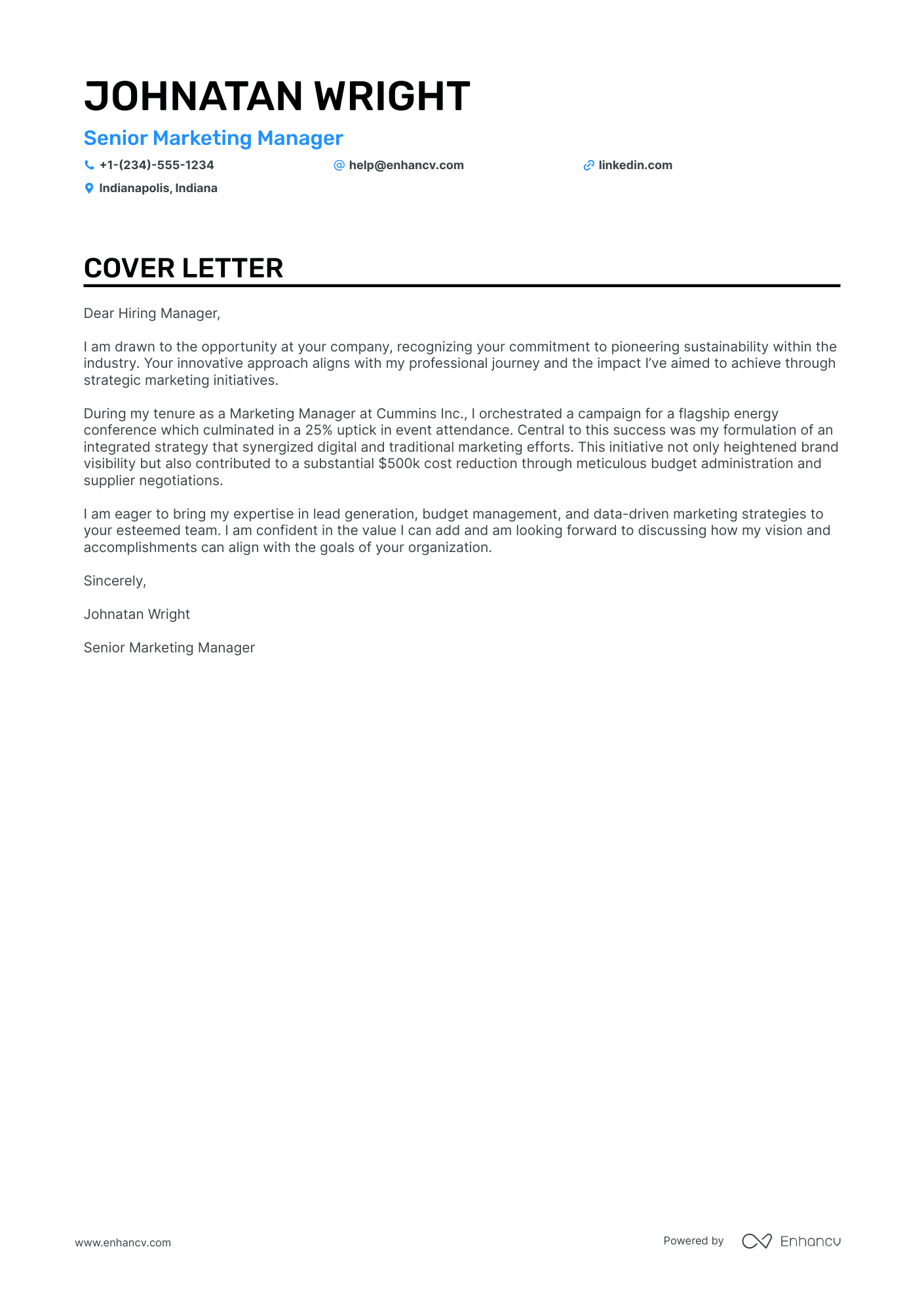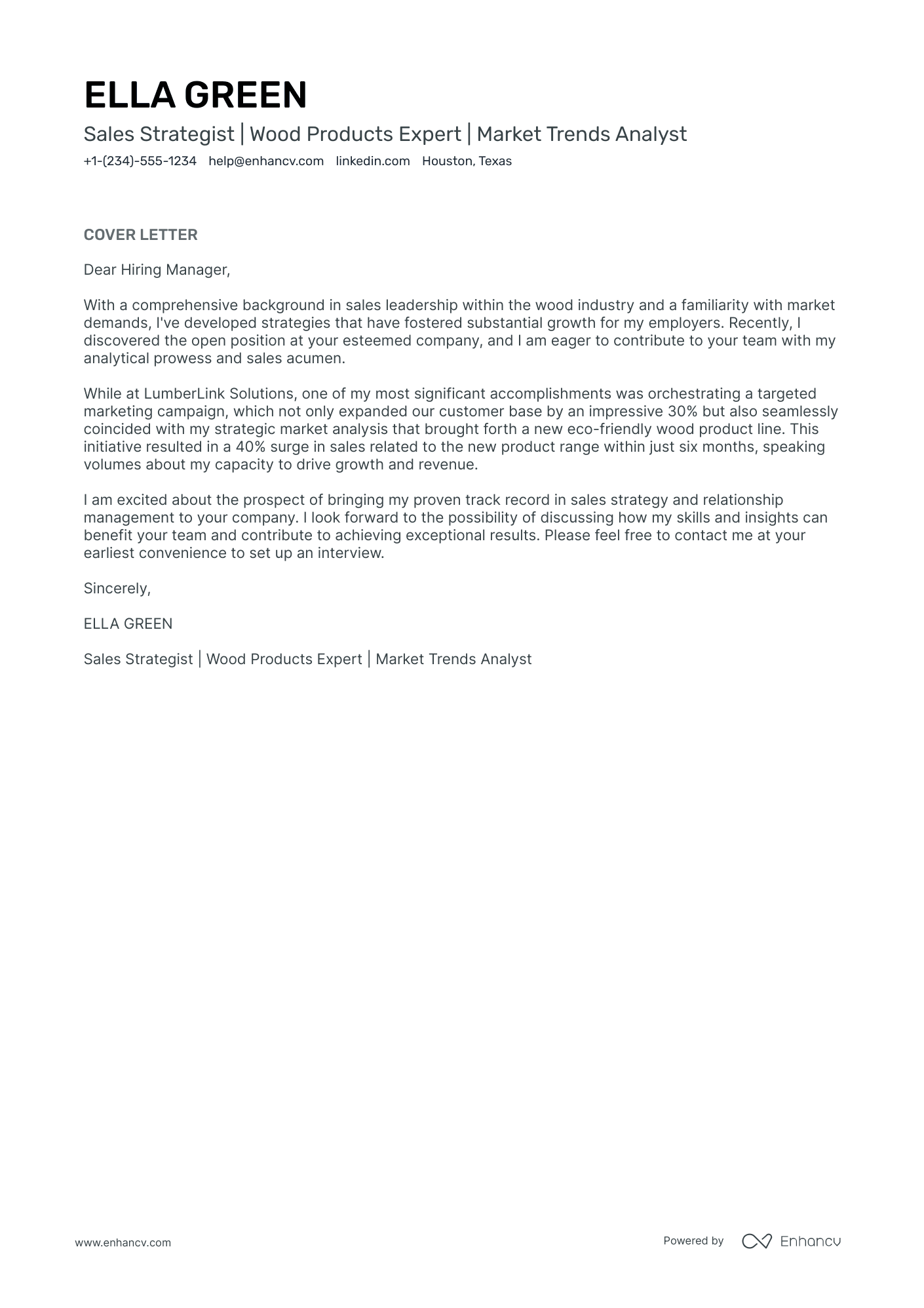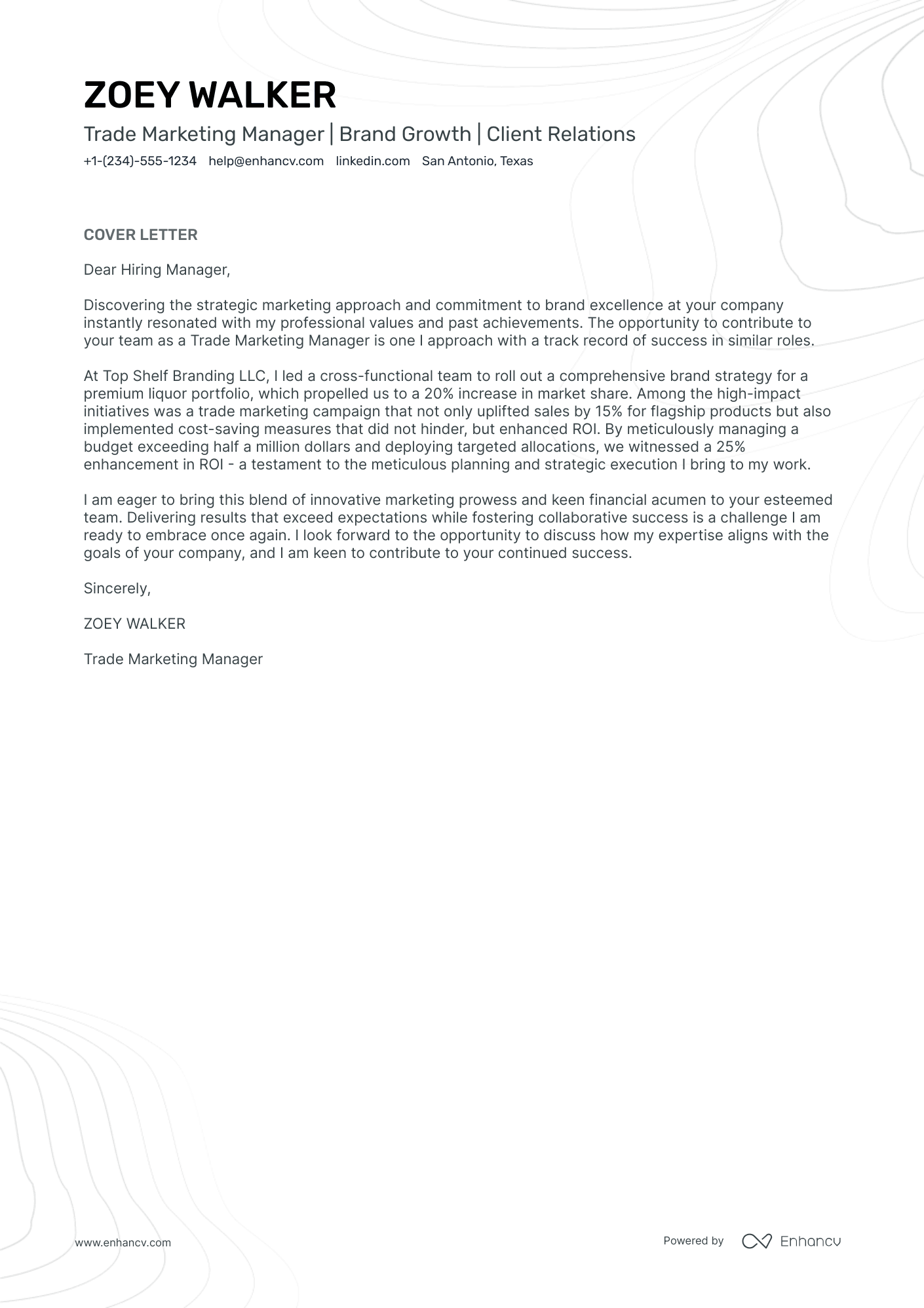Embarking on the job hunt, you've found the perfect marketing manager position, but there's a hitch: crafting a compelling cover letter. Striking the balance between formality and a fresh voice, your letter must narrate a proud professional milestone without echoing your resume. Fitting your story into a concise, one-page document may seem daunting. Fear not—you're about to learn how to create a standout cover letter that's just the right blend of personal achievement and professional finesse.
- Including all the must-have paragraphs in your structure for an excellent first impression;
- Learning how to write individual sections from industry-leading cover letter examples;
- Selecting the best accomplishment to tell an interesting and authority-building professional story;
- Introducing your profile with personality, while meeting industry standards.
And, if you want to save some time, drag and drop your marketing manager resume into Enhancv's AI, which will assess your profile and write your job-winning cover letter for you.
If the marketing manager isn't exactly the one you're looking for we have a plethora of cover letter examples for jobs like this one:
Drop your resume here or choose a file.
PDF & DOCX only. Max 2MB file size.
Marketing manager cover letter example
ELLA GREEN
New York City, NY
+1-(234)-555-1234
help@enhancv.com
- Highlighting previous relevant experience: The cover letter emphasizes the candidate's direct experience managing a high-profile product launch at Google, showcasing their ability to handle significant responsibilities and achieve tangible results.
- Quantifying achievements: By mentioning specific figures such as budget management ($5M), market share increase (35%), and ROI improvement (20%), the candidate provides concrete evidence of their success and impact in previous roles.
- Demonstrating strategic insight: The cover letter underscores the candidate’s strategic planning abilities, showing that they can lead complex marketing campaigns with multiple facets and coordinate across various channels efficiently.
- Company-specific tailoring: The writer makes sure to align their skills and achievements with the prospective organization's goals, indicating they have researched the company and understand how their expertise can contribute to its objectives.
The visual appeal of your marketing manager cover letter: format, font, and structure
When using our cover letter builder, make sure to include these vital sections:
- Header (with your name, contact details, the role, and date);
- Greeting (that's personalized to the recruiter);
- Introductory paragraph (to capture attention);
- Body paragraph (to tell a story of how you've obtained your job-crucial skills);
- Closing paragraph (ending with a nod to the future ahead);
- Signature (that is not a must).
Our cover letter templates are already set up for you with the best marketing manager cover letter design with single-spaced paragraphs and a one-inch margin.
As for the font of your marketing manager cover letter, use the same one as you did in your resume (where modern and simple fonts, like Rubik and Bitter, take precedence over Arial and Times New Roman).
Your marketing manager cover letter is created with the recruiters in mind - as no Applicant Tracker System looks over this part of your profile.
When sending over your marketing manager cover letter, download it in PDF. This format allows your information and design to stay intact and to keep the same visual quality.
Don’t let cover letters slow you down. Use our free cover letter generator to create one in no time.
The top sections on a marketing manager cover letter
- Header: Include your name, contact information, and the date, ensuring the hiring manager can easily identify and reference your application, which is crucial for a marketing manager's attention to detail.
- Greeting: Personalize the salutation by addressing the hiring manager by name, which demonstrates your research skills and personal touch, both important in a marketing role.
- Introduction: Highlight your enthusiasm for the company and the marketing manager position, briefly mentioning key achievements that align with the job's requirements, displaying your strategic communication skills.
- Body: Detail your relevant experience, especially successes in previous marketing campaigns and leadership roles, showcasing your ability to plan, execute and manage marketing strategies effectively.
- Closing: Reiterate your interest and propose a next step or call to action, such as a meeting or a discussion, which illustrates your proactive approach—a vital trait for a marketing manager.
Key qualities recruiters search for in a candidate’s cover letter
- Strategic Thinking: Marketing managers must be able to develop and execute long-term strategies to improve brand awareness and achieve business goals.
- Data-Driven Decision Making: They should have the ability to analyze market data and consumer trends to inform targeted marketing campaigns and measure performance effectively.
- Creativity and Innovation: Being able to conceive original marketing campaigns and innovative ideas to differentiate the brand in a competitive market is crucial.
- Leadership and Team Management: Marketing managers need to lead and motivate their teams, coordinate with other departments, and manage external agencies to ensure cohesive efforts.
- Communication Skills: They must be excellent communicators, able to clearly convey brand messages and marketing strategies to stakeholders, team members, and customers alike.
- Digital Marketing Expertise: Proficiency in digital marketing tools and platforms, SEO, SEM, social media advertising, and familiarity with CRM software is essential in today's digital-first marketplace.
How to start your marketing manager cover letter: with a greeting, of course
Have you ever considered just how powerful a personalized salutation can be?
We sure have news for you! Your marketing manager cover letter should start with the right salutation to recruiters, nurturing a sense of respect and individuality.
Greet recruiters by using their first name (e.g. "Dear Tom" or "Dear Patricia") if you've previously established contact with them.
Otherwise, opt out for the less familiar, "Dear Ms. Peaches" or "Dear Ms Kelsey", if you've found the recruiter's name on LinkedIn or a corporate website.
"To whom it may concern" is never a good option, as it creates a sense that you've been sending out your marketing manager cover letter to anyone. Instead, use "Dear HR team" or "Dear (company name) recruiter" for a feeling of exclusivity.
List of salutations you can use
- Dear Hiring Manager,
- Dear [Company Name] Team,
- Dear [Department Name] Hiring Committee,
- Dear Ms. [Last Name],
- Dear Mr. [Last Name],
- Dear Dr. [Last Name],
Introducing your profile to catch recruiters' attention in no more than two sentences
The introduction of your marketing manager cover letter is a whole Catch 22 .
You have an allocated space of no more than just a paragraph (of up to two sentences). With your introduction, you have to stand out and show why you're the best candidate out there.
Set out on a journey with your marketing manager cover letter by focusing on why you're passionate about the job. Match your personal skills and interests to the role.
Another option for your marketing manager cover letter introduction is to show you're the ideal candidate. Write about how your achievements and skills are precisely what the company is looking for.
However you decide to start your marketing manager cover letter, always remember to write about the value you'd bring about. Making it both tangible (with your metrics of success) and highly sought out.
What to write in the middle or body of your marketing manager cover letter
Here's where it gets tricky.
Your marketing manager cover letter body should present you in the best light possible and, at the same time, differ from your resume.
Don't be stuck in making up new things or copy-pasting from your resume. Instead, select just one achievement from your experience.
Use it to succinctly tell a story of the job-crucial skills and knowledge this taught you.
Your marketing manager cover letter is the magic card you need to further show how any organization or team would benefit from working with you.
Finishing off your marketing manager cover letter with what matters most
So far, you've done a fantastic job in tailoring your marketing manager cover letter for the role and recruiter.
Your final opportunity to make a good impression is your closing paragraph.
And, no, a "Sincerely yours" just won't do, as it sounds too vague and impersonal.
End your marketing manager cover letter with the future in mind.
So, if you get this opportunity, what do you plan to achieve? Be as specific, as possible, of what value you'd bring to the organization.
You could also thank recruiters for their interest in your profile and prompt for follow-up actions (and organizing your first interview).
What to write on your marketing manager cover letter, when you have zero experience
The best advice for candidates, writing their marketing manager cover letters with no experience, is this - be honest.
If you have no past professional roles in your portfolio, focus recruiters' attention on your strengths - like your unique, transferrable skill set (gained as a result of your whole life), backed up by one key achievement.
Or, maybe you dream big and have huge motivation to join the company. Use your marketing manager cover letter to describe your career ambition - that one that keeps you up at night, dreaming about your future.
Finally, always ensure you've answered why employers should hire precisely you and how your skills would benefit their organization.
Key takeaways
Your marketing manager cover letter is your best shot at standing out by showing your motivation and the unique skills you'd bring to the job:
- Chose no more than one achievement, which you'd be talking about in the body of your marketing manager cover letter, by focusing on skills and outcomes;
- Address recruiters with their first or last name, or "Dear Hiring Manager" in your marketing manager cover letter greeting;
- Introduce in no more than two sentences what makes your profile unique (perhaps it's your motivation, enthusiasm, or appreciation of the company you're applying for);
- Select the same font you have used in your resume (avoid Times New Roman and Arial, as most candidates tend to invest in them);
- Close your marketing manager cover letter with a promise of how you see yourself growing in the company and the benefits you'd bring about.
Marketing Manager cover letter examples
By Experience
Senior Marketing Manager
By Role








